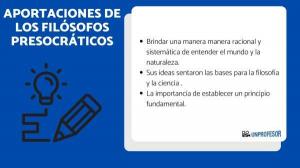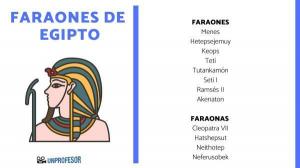The main DIFFERENCES between PLATO and ARISTOTLE

Image: Comparison Chart
In this lesson from a TEACHER we explain the differences between Plato and Aristotle, teacher and disciple, respectively and both, are considered the most influential thinkers of the history of mankind, and its ideas, has emerged an important part of the philosophy later. The rationalism and idealism, are born from the ideas of Plato, and the empiricism, drink of Aristotelian philosophy.
Between them, there are similarities, but also differences, and they can even be observed in the table of Rafael, The school of Athens, Plato points upwards, towards the world of ideas, for him, the only true one, while Aristotle it does it downwards, because the true world is the sensible one, the essence of things, it is found in them themselves. If you want to know them, continue reading this article. Start the class!
Index
- Ontology, one of the differences between Plato and Aristotle
- Physics of Plato and Aristotle
- Epistemological differences between Plato and Aristotle
- Ethics of Plato and Aristotle
- Platonic VS Aristotelian Anthropology
Ontology, one of the differences between Plato and Aristotle.
We begin by talking about the differences between Plato and Aristotle to focus on the topic of ontology. Plato part of a division of reality and thus defend the separate existence of two worlds (ontological dualism), the sensible world and the intelligible world, the latter, the true world, that of ideas, and the former, a mere copy of it, manufactured by the Demiurge.
The sensible world is the physical world, characterized by change, multiplicity, particularity and is subject to generation and corruption. It is only appearance. This world is accessed through the senses and is the world of opinion.
The intelligible world is incorruptible, immutable, it is the world of universal and necessary ideas, the real world of essences, of science, only accessible. Therefore, the essence of things is outside them, in the intelligible world. To explain your ontological dualism, Plato resorts to Myth of the Cavern.
Aristotledoes a harsh criticism of Plato's dualism by denying the existence of the intelligible world. For the stagirite, there is only one true world, the sensible world, which is made up of substances, in turn composed of matter and form or essence. Therefore, the authentic reality is the singular, concrete and individual, that is, the substance and the essence of things is within them and not separate. Aristotle, puts an end to Plato's ontological dualism. In this sense, Aristotle's philosophy can be understood as an overcoming of Plato's philosophy.
Plato and Aristotle Physics.
Another of the main differences between Plato and Aristotle refer to physics. For Plato, the sensible world is not real, it is mere appearance, an imperfect copy of the intelligible world, and therefore it is not an object of thought. In the physical world, things change, they are constantly movement and in order to understand something, it is necessary to first know the idea in which it participates, that is, the idea it imitates. The sensible world, was created by the Demiurge, an ordering principle, and therefore, it is directed to an end. Here you can see the finalist conception of that of Athens.
For his part, Aristotle, it will make a revaluation of the sensible world, of nature, the philosopher's object of knowledge. The movement, is not synonymous with imperfection, but quite the opposite, being the characteristic of the material substance, and defines it as the passage of power to act. The immobile motor, the first motor, would be the principle that gives movement to the world.
Epistemological differences between Plato and Aristotle.
Plato despises the sensible world precisely because of the movement that characterizes it and that constitutes a source of error. Everything in the physical world it is nothing more than appearance, is the world of opinion or doxa. Instead, the intelligible world is the world of science. Thus, Plato will identify knowledge with scientific knowledge, that is, with the knowledge of universal and necessary things, of Ideas or essences.
On the soul, enclosed in the human body, is the source of all knowledge, which means that Plato defends the existence of innate ideas. The soul, says the philosopher, already knows these ideas, because it was already in the intelligible world, from which he fell silent, and therefore, knowing is remembering (Reminiscence theory).
The only valid method of knowledge is the dialectic, a process of ascension, which goes from ignorance to the contemplation of Ideas. The dialectics and the math they are the true sciences. In addition, it is possible to apply science to ethics and politics.
Aristotle, on the other hand, will defend the sensible world, that although it does not constitute scientific knowledge, it is the origin of the truth. You can only know one thing, through your Causes, this is scientific knowledge for the thinker.
The senses, and not reason, are the origin of all knowledge. Therefore, there are no innate ideas, since the mind is a clean sweep (empiricism) and only through a process of abstraction is it possible to get to know the form, the universal.
He would also reject Estagira's, the dialectic, stating that induction and deduction they are the only scientific methods of knowledge. The scientific knowledge, it only has a theoretical purpose, and never a practical one.
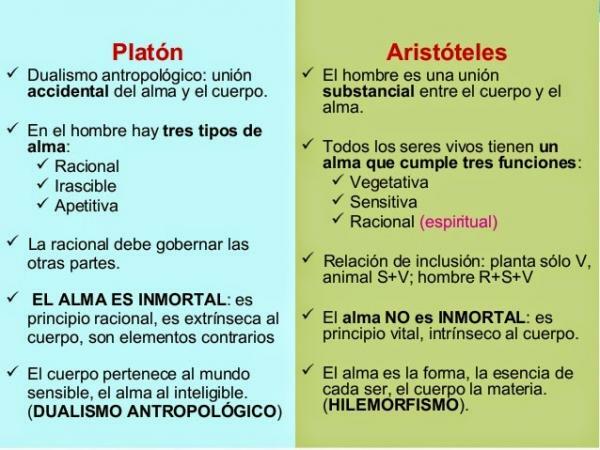
Image: Comparison Chart
Ethics of Plato and Aristotle.
On the one hand, Plato's ethics is a finalist, and virtue consists in the knowledge of the Good, which is one. Wisdom, for the philosopher, is inseparable from prudence, the two concepts being confused. His optimistic and innocent vision of the human being leads him to affirm that everyone who knows the Good will act well, and badly otherwise. That is to say, the origin of evil would be ignorance.
Plato, distinguishes in the human soul 3 parts: rational, irascible and concupiscible, and to each of these parts there corresponds a virtue, viz., wisdom and prudence, courage, and temperance, respectively, and they also had a position in the polis: rulers, warriors, peasants and merchants. The Justice, the greatest of the virtues, consisted in the harmony between the three parts of the soul.
Aristotle defend a finalist and eudemonist ethic, by affirming that the purpose of life is happiness, and unlike Plato, he affirms that there are many types of goods. For him, it is through habit, how a person becomes virtuous. Furthermore, Aristotle will differentiate between the ethical virtues and dianoetics.
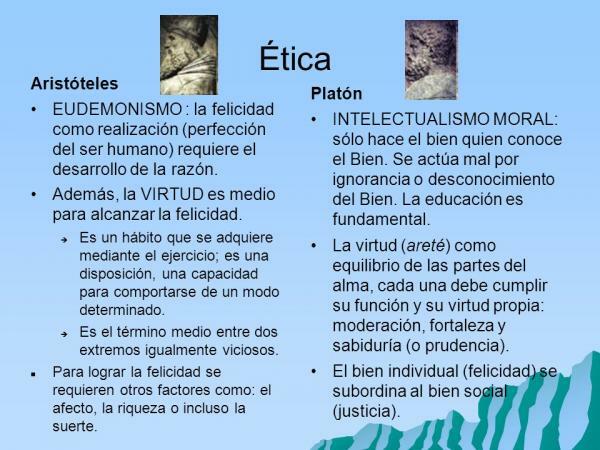
Image: Slideplayer
Platonic VS Aristotelian anthropology.
And we end this lesson with the differences between Aristotle and Plato talking about anthropology. Plato's ontological dualism leads to his anthropological dualism And thus, for this thinker, the human being is made up of two different and independent substances: body and soul. The first belongs to the sensible world and the second to the intelligible. The soul is immortal, and can live separated from the body, and in fact, after death it will separate from it to return to the world of Ideas. The human soul has 3 parts: rational, irascible and concupiscible, and his own activity is knowledge, to ascend, thus, to the intelligible world.
For Aristotle, the human being is a substance, a compound of matter and form, being the form, the essence or the soul and the matter, the body. The soul is the vital principle, but it cannot live apart from the body, but both live in the substance that is the human being. He distinguishes three types of soul: the vegetative, the sensitive and the rational.
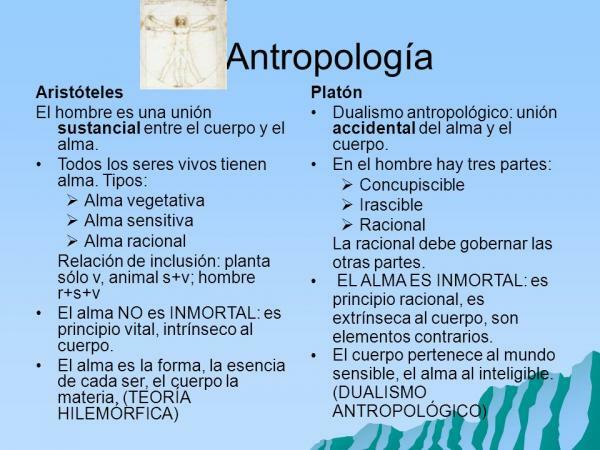
Image: Slideplayer
If you want to read more articles similar to Differences between Plato and Aristotle, we recommend that you enter our category of Philosophy.
Bibliography
Plato. The Republic. Ed. Gredos, 1986
Aristotle. Metaphysics. from. NoBooks, 1968

